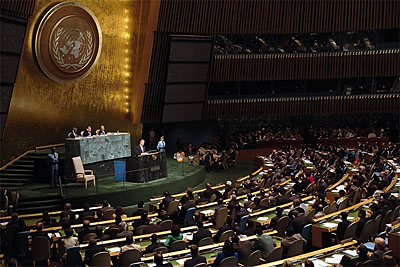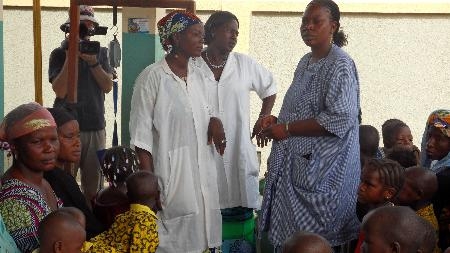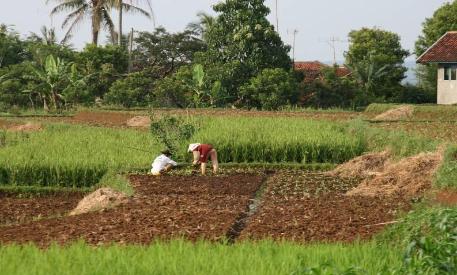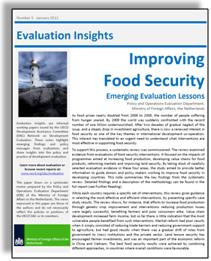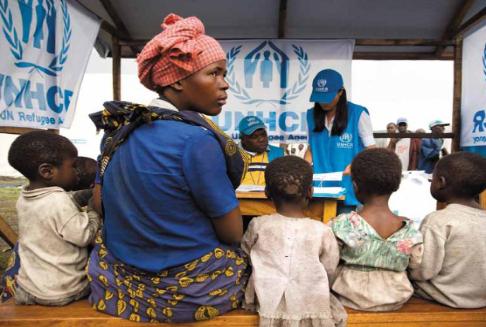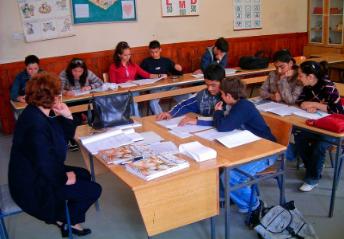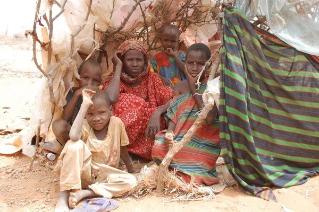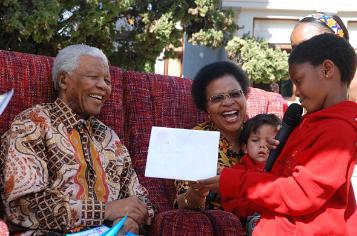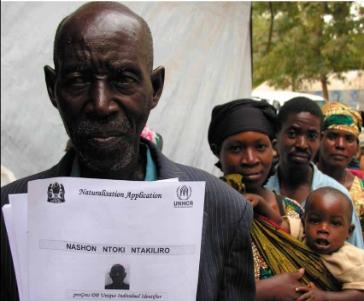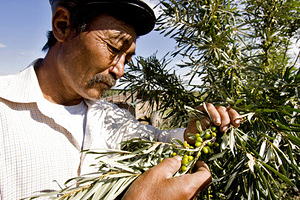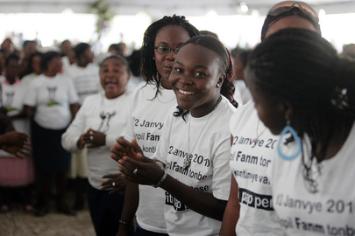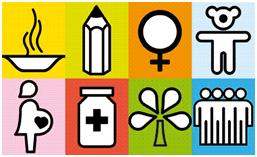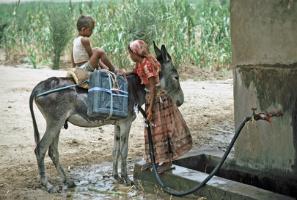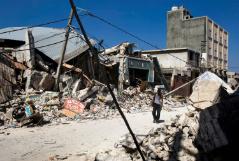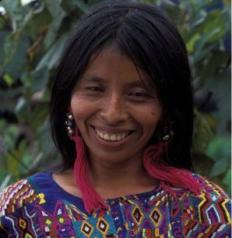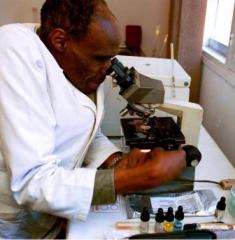Front Page Past Editions
The DEReC Front Page was launched in February 2009 by the Secretariat of the DAC Network on Development Evaluation. The Front Page highlights evaluation reports that are relevant to major current events and policy issues, with the goal of encouraging wider use of evaluation results to improve development policy and practice. New editions of the Front Page are featured on the DEReC homepage periodically. Some past editions can be found below.
HAPPY UNITED NATIONS DAY
The Canadian International Development Agency (CIDA) recently reviewed the development effectiveness of the UNDP. The reviewed evaluations report that while most UNDP programs are achieving their development objectives, weaknesses remain in some areas. The most frequently cited factor hindering objectives achievement was dispersion of UNDP country programming across too many projects, too wide a geographic area or too many institutions. Factors which contributed to UNDP effectiveness in achieving development objectives include effective investment in knowledge development; consultation to strengthen support for priority policies; and effective advocacy for the MDGs. The evaluation report "Democracy Suuport through the UN", from the Norwegian Agency for Development Cooperation (Norad) explains that UN agencies have normally had sufficient skills and capacities in the identification and design phases and in a number of cases for the delivery of good results. But in several cases it was clear that the UN moved to a more administrative focus over time, letting the contents dimension weaken, thus undermining longer-term results though donors including Norway were also guilty of the same. Recent steps by UNDP HQ to strengthen performance monitoring systems are important for improving the organisation’s ability to implement such activities. To what extent this will lead to improved performance on the ground remains to be seen.
>>> Learn more about our work on evaluating multilateral effectiveness
Focus: Crisis in Mali
Photo: Staff and patients at a community health centre in Mali (IOB, 2011)
Mali receives some $1 billion per year in official development assistance, 42% of it in the form of support to the national budget. Though it remains one of the poorest countries in the world, with 5% real economic growth and a democratically elected government, Mali has long been viewed as a relatively good performer in the region. A coup d'état and rebellion in the north earlier this year caused the government to collapse and fighting has forced tens of thousands to flee their homes (AlertNet). A number of recent evaluations examine the role of Mali's development partners in supporting governance, poverty reduction and growth in the country:
An evaluation of budget support in Mali found that assistance was an effective instrument for supporting progress in social sectors such as education and health, and supporting poverty reduction, where political will and government policy and capacity were in place. Where partners disagreed on priorities for reform, as was the case for decentralisation, budget support was unable to induce changes and progress was slow. The evaluation also points to weak investment in rural areas.
An evaluation of aid effectiveness efforts was carried out by an independent evaluation team working with Mali's Ministry of Economy and Finance. The review found that changes in donor behaviour, notably efforts to make aid less fragmented and more in-line with national priorities, have made a difference.
To celebrate World Health Day, we are highlighting recent development results in the field of health, focusing on Uganda and Botswana.
While some good results have been achieved in Uganda, the Paris Declaration Evaluation found that some work still needed to be done to ameliorate the impact on the ground, with many local governments still lacking fully adequate service delivery capacity. Still too many resources entering Uganda do not trickle down to the local level, remaining in the country's capital, as explained by Ugandan local health officials in the video above.
One success story in the health sector stems from Norwegian development cooperation with Bostwana. The recent Evaluation of Norwegian Health Sector Support to Botswana describes how Norway’s assistance, from 1975 to present, has contributed positively to the development of the Botswana Health System over the past decades. This was achieved principally through comprehensive support (infrastructure and systems) to the development of a functioning primary care health system enabling wide access for the people of Botswana, with the cooperation taking a Programme approach rather than a Project approach. Norway's use of Bostwana's country systems proved to be an effective strategy, contributing to a sustained improvement in the country's development of its health sector.
Many of these lessons learnt from improved results in health sector development can be taken to build the foundation for a better approach to aid effectiveness, as described in this recent Guardian article on healthcare and development.
More resources on development cooperation in the health sector:
- - Aid statistics to the health sector - Learn about the OECD's Task Team on Health as a Tracer Sector
Food security: what lessons learned? Photo: Farmers working in rice field, Bandung, Indonesia (Jisse Kranen 2009)
As food prices nearly doubled from 2006 to 2008, the number of people suffering from hunger soared, as witnessed by the current food crises in the Horn of Africa and the Sahel region. By 2009 the world was suddenly confronted with the record number of one billion undernourished. After two decades of gradual neglect of the issue, and a steady drop in investment agriculture, there is now a renewed interest in food security as one of the key themes in international development co-operation. Improving food security - A systematic review of the impact of interventions in agricultural production, value chains, market regulation, and land security: This systematic review by the Netherlands used information from 38 selected case studies and 46 other reviews to evaluate the impact of interventions aimed at increasing production, developing value chains, reforming market regulation, and improving land tenure security, on food security.
Agricultural input subsidies in Sub-Saharan Africa: This study by Denmark provides an assessment of the overall performance of agricultural input subsidy programmes in Malawi, Zambia, Ghana and Tanzania, where so-called “smart” subsidies have been introduced in an attempt to maximise effects at the lowest possible costs.
|
|||||||||
|
20 November: Universal Children's Day
Primary school children in class, in Harar, Ethiopia.
Universal Children's Day marks the anniversary of the signing of the UN Convention on the Rights of the Child (CRC), a human rights treaty setting out the civil, political, economic, social, health and cultural rights of children. In honour of Children's Day we highlight a recent evaluation of child rights-focused programmes, conducted by Norway and Sweden.The findings from four country case studies – Guatemala, Kenya, Mozambique and Sudan – underpin the conclusions and recommendations in this synthesis report.
The evaluation examined the extent to which a child rights perspective was effectively integrated into development projects. Interventions supporting child rights should reflect the four main principles of the UN Convention on the Rights of the Child (CRC): (i) non-discrimination; (ii) the right to life, survival and development; (iii) the right to express views and be heard; and (iv) the best interest of the child. Findings from the evaluation The evaluation strongly recommends using the CRC as a common basis for political dialogue between development partners, as well as for programming of development assistance aimed at promoting children's rights. Building a public system that respects, protects, promotes and fulfils child rights as enshrined in the CRC is a very demanding task and a long time horizon is required. Development partners must be prepared to engage in the long run in a way that nurtures national ownership.
The interventions reviewed in the four countries suggest that headway is being made but formidable challenges remain before a functional system can be said to be in place. Arguably Kenya has made the most progress, but even that country has a long way to go. UNICEF, with donor support, appears to have adopted a holistic approach to child rights that is bearing fruit...
Read the full evaluation "Supporting Child Rights: Synthesis of Lessons Learned" |
|||||||||
|
October 24: United Nations Day
Families at a United Nations refugee centre. Photo: UNHCR/P.Taggert
In honour of UN Day: Spotlight on Evaluation in UN Agencies
Joint External Evaluation of the UNHCR Joint Organisation Strategy : While all four partners of the Joint Organisation Strategy recognise the potential of the Strategy and its importance, the operating modalities of the arrangement are proving to be more complex than working in a bilateral fashion.
The OECD DAC Evaluation Network works with the United Nations Evaluation Group to peer review evaluation systems of UN agencies:
Peer Review of the Evaluation Function of UNIDO (UN Industrial Development Organisation): To fully meet recognized evaluation standards, current efforts to improve the basic foundation for evaluation and build up a sound monitoring system that supports assessment of outcomes and impact should be continued. This is fundamental for ensuring evaluability and credibly in establishing outcomes and impact of programmes. The Evaluation Department has the potential to contribute even more significantly to the strategic thinking of UNIDO by ensuring that evaluations address the twin issues of relevance and overall impact on sustainable development.
Learn more about our work on multilateral effectiveness
|
|||||||||
|
Back to school edition: Focus on Support to Education
Children share notes in a school in Serbia.
We highlight here an evaluation of Finland's higher education institution programme. Beyond the lessons for higher education, the evaluation also looks at the values and challenges of a triangular or South-South approach to co-operation:
|
|||||||||
|
August 2011: Food Crisis and Famine in the Horn of Africa
A mother and her four children at the Dolo Ado refugee camp, Ethiopia. This week, world leaders will meet in Rome to assess the evolving situation in the Horn of Africa and look at the root causes of the crisis and the longer-term needs of countries in the region to sustainably enhance livelihood resilience on a wide scale. As governments, NGOs and private citizens support the ongoing relief efforts, we contribute to discussions on some of the core issues by drawing on evaluations from DEReC.
|
|||||||||
|
19 July 2011: Nelson Mandela International Day
Photo: Mr. Mandela and Ms. Graça Machel with children during a
To celebrate Nelson Mandela International Day, 18 July 2011, we have highlighted recent evaluation reports looking at results of development assistance to South Africa. Evaluation of Norwegian Business-Related Assistance to South Africa: The program focuses on the initial stages of supporting business relationships between Norwegian and South African companies. It provides this through a partner search for Norwegian companies and travel grants.This impact is assumed to be achieved indirectly through increased economic activity and employment. However, this is not corroborated with findings from interviews with staff at Norad, the Norwegian Ministry of Foreign Affairs (MFA) and Innovation Norway nor with performance indicators for the programme which do not keep any records on poverty or development impact.
Evaluation of the Paris Declaration Phase II, South Africa: There is strong, ongoing application of country ownership principles, where South Africa continually seeks to maintain its independence from development partners, and where recent restructuring around sector priorities in order to better ‘deliver’ aid has occurred. South Africa does not have a formal agreement for the implementation of the PD, but has an Aid Effectiveness Action Plan.
Managing Aid Exit and Transformation: This report presents the findings from an evaluation of how four donor countries – Denmark, the Netherlands, Norway and Sweden – are approaching and managing aid transformation in South Africa.The renewed focus on peacebuilding in Africa coupled with the efforts to phase out traditional development aid has led to stronger emphasis on working with South Africa, including through trilateral efforts
|
|||||||||
|
20 June 2011: World Refugee Day Photo: Denmark, Ministry of Foreign Affairs (2010)
Evaluation of the Protracted Refugee Situation for Burundians in Tanzania: This evaluation, published by the United Nations High Commissioner for Refugees and the Danida Evaluation Department, looks at efforts to promote durable solutions and improvements in the life of refugees that have been outside of their home countries for decades. The study focuses on the situation of Burundian refugees in Tanzania. The evaluation found that strong commitment of top-level officials in the Tanzanian Government played a crucial role in shaping durable solutions for refugees. Political will and leadership are key.
Impact Evaluation of Humanitarian Assistance to the Repatriation and Reintegration of Burundi Refugees: This study examines humanitarian assistance provided to Burundian refugees during their return to, and reintegration in their home country, between 2003 - 2008. The analysis concludes that near-complete repatriation and reintegration are facts of life and were achieved with an indispensable contribution from the program of assisted return. Risks to sustainable reintegration are discussed and recommendations provided on how to control some of them.
Evaluation of the UNHCR Joint Organisation Strategy with Canada, Denmark and the UK: This joint evaluation examines a collaborative effort to improve coordination between donors and the United Nations High Commissioner for Refugees, the primary UN body dealing with refugees. It concludes that, notwithstanding some limitations, the joint strategy improved UNHCR's overall performance and increased harmonisation of bilateral efforts. It suggests renewing the agreement and outlines a number of suggestions for doing so.
|
|||||||||
|
22 April 2011: Earth Day
UN Photo/ Eskinder Debebe
Lessons from evaluation reports:
The Sustainability Dimension in Addressing Poverty Reduction (Finland): The lack of clarity in the concept of sustainability needs to be addressed: studies should be undertaken to identify options for measuring sustainability; guidelines should be developed to ensure that proxies of sustainability are integrated into activity design. Environment Capacity Development Projects in Indonesia and the Philippines (Asian Development Bank): Environmental agencies need to take ownership of technical assistance projects, while in parallel requiring long-term sustained assistance. Building strong environmental governance, to ensure transparent and cost-effective assistance outcomes, should also be improved. |
|||||||||
|
INTERNATIONAL WOMEN'S DAY – 8 March 2011
UN Photo/Sophia Paris
Integrating gender equality into evaluations means assessing how an investment has contributed to the achievement of results in improving the lives of women and men. More thematic evaluations of gender equality and women’s empowerment are taking place but more progress in incorporating gender perspectives into general evaluations of development assistance needs to be done.
Lessons from evaluation reports:
Gender and Value Chain Development : Ensuring that gender issues are taken into consideration in value chain-related interventions is vital for facilitating the development of inclusive value chains that benefit both women and men.
Lessons from Evaluations of Women and Gender Equality in Development Cooperation (Norad): As efforts are made to promote gender equality in development cooperation, the evaluations include recommendations that organisations must have clear goals for their activities, must ensure stronger leadership of work on women and gender equality, must invest more resources and must organise their work better and more systematically. The evaluations recommend clarifying concepts and terminology, providing clearer mandates and improving training.
Resources on gender and evaluation: - - Economic Empowerment of Women : How can specific projects and/or policy interventions work to increase gender equality and to foster economic development through increased empowerment of women. |
|||||||||

January 2011: South Sudan: Are donors aiding peace?
Polling station during the Sudan referendum, Jan 2011. Sudan is at a critical stage in its history. In the referendum of January 2011 citizens of Southern Sudan voted for independence, six years after the peace agreement that ended the civil war with the North. The new government will need to diffuse the potential for violence in order to build a foundation for long term development. What can the international community do to support this process? A recent joint evaluation sheds light on how donors have done so far, and what changes are needed to better support peacebuilding in Africa's newest state:
to Conflict Prevention and Peacebuilding Activities in Southern Sudan" Key findings and recommendations: Policy Brief Full in-depth analysis: Evaluation Report
In 2010 this independent evaluation was conducted on behalf of the largest donors in Southern Sudan. The central question was: to what extent has the international community contributed to conflict prevention and peacebuilding in Southern Sudan since the signing of the 2005 Comprehensive Peace Agreement (CPA), and what needs to be done now as the country enters a new era? The evaluation was conducted by a multidisciplinary team of international and Sudanese evaluators.
This evaluation is part of an ongoing collaborative effort to encourage quality, independent evaluation in the fields of conflict prevention and peacebuilding. Read more
Other reports on donor peace and development programmes in Sudan:
|
|||||||||
|
12 January 2011: Haiti Earthquake Recovery One Year On
Photo: Debri in Port au Prince. Patrick McManus, Irish Aid
Evaluations of the immediate earthquake response have been carried out by humanitarian organisations and donor countries -- demonstrating their will to both learn from and improve the current response. These evaluations and other resources can be found on the ALNAP Haiti Learning and Accountability Portal. The OECD is also working with donors to and provide better evidence about what is working, what is not and why.
Key resources on the Haiti earthquake response:
A few important messages from evaluations so far: In the context of broader debates about the functioning of the humanitarian system - and the adequacy of the Haiti earthquake response in particular - evaluators are providing some concrete lessons. Sadly, many of these lessons have been highlighted in the past (see this lEG brief or ALNAP's lessons note). More attention is needed on creating incentives for change and implementing lessons to ensure that these mistakes are not repeated (again).
|
|||||||||
|
HUMAN RIGHTS DAY - 10 DECEMBER 2010
Photo source: UN Photo/X Don't miss: - The Evaluability of Democracy and Human Rights Projects: A logframe-related assessment - A Review of Ireland Aid’s Human Rights and Democratisation Scheme - Parliamentarians for Global Actions, Peace and Democracy Programme
Hot topic! Human Rights Day 2010, Speak up, Stop discrimination! |
|||||||||
|
October 2010 The Millennium Development Goals (MDGs) guide the work of most donor agencies. As a result, evaluators often use the MDGs to frame their assessments. Some have also carried out specific evaluations of MDG progress. While monitoring of the MDGs shows what has or has not been achieved, evaluations try to explain how results occur and why they matter - and in these ways support collective learning and accountability for results.
Don't miss! Lessons from evaluation on strengthening MDG performance |
|||||||||
|
FOCUS ON WATER - August 2010
According to the United Nations Development Program (UNDP), more than 1 billion people – about one in six people in this world – have no access to clean and safe drinking water while over 2 billion lack accesses to adequate sanitation. The effects of unclean water contribute to a cycle of poverty, conflict, and disease. UN Photo/Martine Perret
What evaluation tells us World Bank has recently completed an evaluation on its support in water and development and this evaluation recommends: - The supply and use of data on water should be strengthened to better understand the linkages between water, economic development, and project achievement by supporting more frequent and more thorough water monitoring of all sorts in the most vulnerable countries. - Donors should work more with clients and partners will help ensuring that critical water issues are adequately addressed, for example to pay extra attention to groundwater conservation and its extraction, to help countries strengthening attention to sanitation, coastal management, irrigation.
Don’t miss: - World Bank/KfW Conference "Water and Development: Taking Lessons from Evaluation"
|
|||||||||
|
FOCUS ON YEMEN
Facts The Republic of Yemen is one of the least developed countries in the world and remains a growing priority for donors. It ranks 150 out of 177 countries on the UNDP Human Development Index (2006). About two thirds of the population, including 80 percent of the country's poor people, live in rural areas and most of them depend on agriculture for their livelihoods. Agriculture is a vital economic sector and the lack of water is a crucial issue. Building the capacity of Yemen's government is a cornerstone to improve governance, reduce instability and introduce sustainable development. Another major issue is to better coordinate foreign assistance and to make sure that it has an impact on the ground (US State Department review on Yemen policy).
What evaluation tells us DFID recently completed a country programme evaluation in Yemen and this evaluation: • Highlights the need to focus on strengthening local staff capacities when funding is increased, The Netherland’s evaluation of water supply interventions in rural Yemen, provides specific advice in this crucial sector: Institutional issues, especially community ownership and management, are the most fundamental determinants of viability and sustainability in rural water supply projects.
Don’t miss: |
|||||||||
|
January 2010: EARTHQUAKE IN HAITI
UN Photo/Marco Dormino
|
|||||||||
|
|
International Day for the
|
||||||||
|
Findings from featured evaluations:
|
|||||||||
|
|
Disarmament Week Disarmament Week begins each year on the anniversary of the founding of the United Nations with the goal of increasing public understanding of armed violence and the urgent need for action. Development evaluations shed light on how disarmament can be supported effectively. |
||||||||
|
Lessons from evaluations of disarmament, demobilization and peacebuilding programmes in conflict-affected countries:
|
|||||||||
|
Photo: World Bank |
World Health Day • 7 April 2009
World Health Day 2009 focuses on health infrastructure during emergencies. DEReC evaluations of health programmes and disaster recovery efforts have shown the importance of strengthening and rebuilding local capacities to respond to emergencies. |
||||||||
New Report! The Quality of Health & Nutrition Data Don’t miss! Evaluation of Community-led Initiatives for Child Survival in India which found evidence that the initiative contributed to a 20% decrease in infant mortality! |
|||||||||
|
Photo: World BankDAC Guidance for Evaluating Humanitarian Assistance |
Aid for Trade Report Launch 6 July 2009
monitors the Aid-for-Trade Initiative to assess what is happening, what is not and where improvements are needed. Assessments on the impact of trade-related assistance are needed to inform ongoing efforts to promote more and better aid for trade as well as policy coherence for development.
Featured trade-related evaluations: New! Trade Facilitation in the Mekong Region Hot topic! Coordinating Trade Capacity Building |
||||||||





